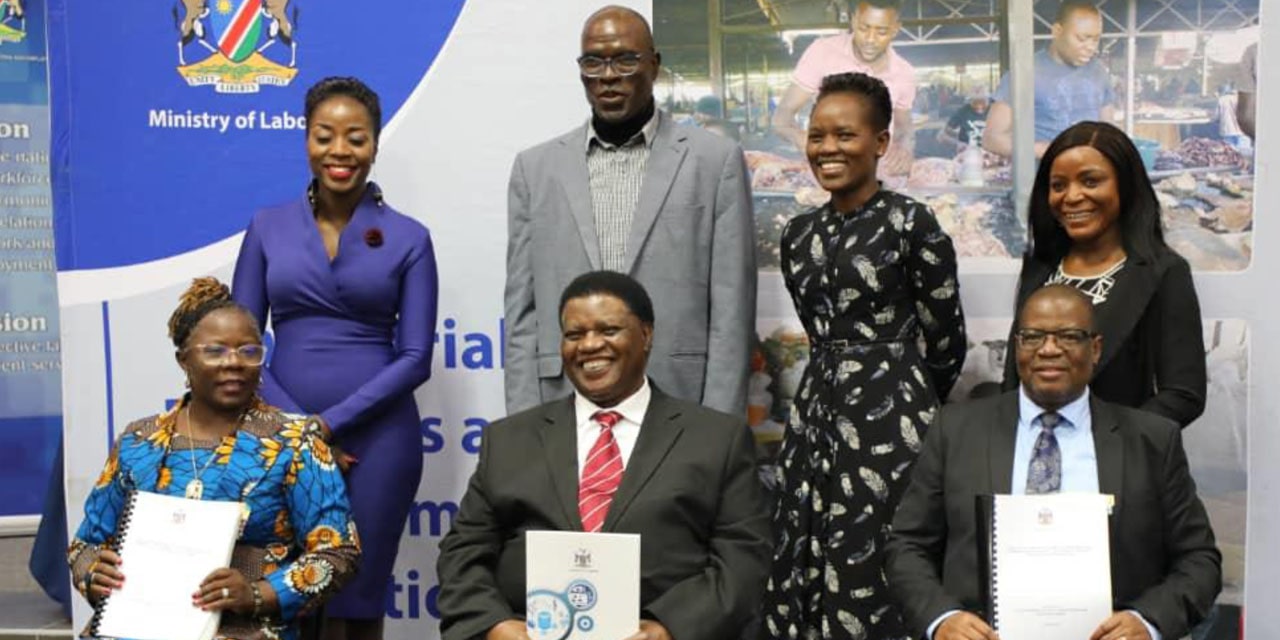Tujoromajo Kasuto
Utoni Nujoma, Minister of Labour, Industrial Relations and Employment Creation, today received the report from the Wages Commission on a National Minimum Wage, which will only be made public until it has been endorsed by the Cabinet.
The minister will scrutinize, study and compare the reports compliance with legal requirements and the viability of its recommendations before making any decision with Cabinet’s approval.
Following these processes, if a national minimum wage order is decided on, it will be gazetted.
The Commission was appointed on 18th February 2021, with broad Terms of Reference of the Commission to investigate all relevant industries, report, and make recommendations to the Minister on a proposed National Minimum Wage.
The minimum wage will apply to all employees, except categories of employees specifically exempted by the Minister in a Wage Order, and on related supplementary minimum conditions of employment.
The Commission concluded its investigation into the possible establishment of a NMW floor for
the country which will contribute to the social protection coverage and poverty eradication agenda, and has the potential to reduce the gender wage gap, as well.
‘’The work of the NMW has been incorporated into Harambee Prosperity Plan || (HPP II) (2021- 2025) under Pillar 3 on Social Progression to determine the Basic Wage Floor across all economic sectors to ensure progress in arresting poverty, income and wealth inequalities, by 2022,’’ the ministry said in a statement.
Handing over the report to the Minister of Labour, chairperson of the Wages Commission, Marius Kudumo expressed appreciation to the Ministry for entrusting the responsibility to the eight-member commission, and participation from the employers, employees, employers’ organizations and trade unions.
In its endeavor to carry out its assignment, the Commission strived to widely publicise its work and has travelled to major towns in Namibia to conduct public hearings in addition to written representations concerning the NMW and related supplementary terms and conditions of employment, including matters set forth in the Terms of Reference, as per the Government Gazette No. 7461 of 15th February 2021. A total of 60 written representations were received from both individuals, trade unions and employers’ organisations, 115 oral presentations made, 433 participants attended during the public hearing meetings held in major towns across the country, two stakeholder engagement meetings, and inputs from 11 institutions including the International Labour Organisation.
Minister Utoni at the handover noted that, Article 95 of the Namibian Constitution requires the government to promote and maintain the welfare of the people by adopting policies, among others.
This is aimed at ensuring that workers are paid a living wage adequate for the maintenance of a
decent standard of living and the enjoyment of social and cultural opportunities. ‘’We all know that many tens of thousands of our people are working hard every day to provide for themselves and their families but are barely able to put bread on the table, let alone to maintain a decent standard of living, due to low wages,’’ he said.
Although the last Labour Force Survey (2018) reports the average wage to be N$7935, Utoni
said that the situation of extreme income inequality, a vestige of apartheid, means that a large component of Namibian working men and women earn less than even N$1500 per month, while a much smaller component earns 20,40 or even 100 times this amount.
Among the objectives of a national minimum wage are to improve the wages of the lowest-paid workers, reducing income inequality and alleviating poverty and improving individual and household income.
The commission was also to look into the potential impacts of the national minimum wage on the individual income of women and men and on household income and the ability of employers to carry on their businesses if they are required to pay the recommended national minimum wages.
The Wages Commission, composed of Dr Marius Kudomo as chairperson, deputised by Gideon Thomas, Edwina T. Hashikutuva, Dr Fritz Nghiishililwa and Nokokure Kariko.




